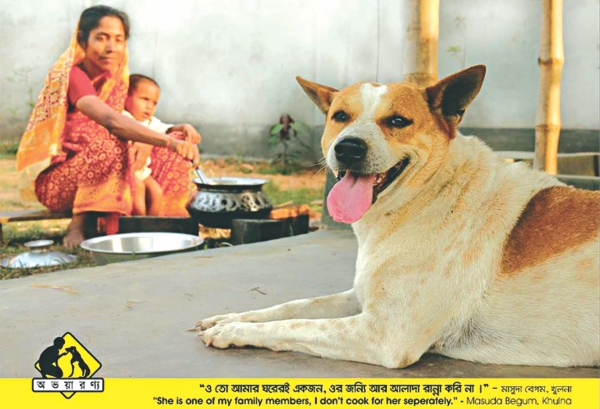Awareness

A Voice for The Speechless – Rubaiya Ahmed
Naziba Basher
Obhoyaronno -- Bangladesh Animal Welfare Society (O-BAWS) is a non-profit company, working to abolish animal cruelty in Bangladesh since 2009. Their areas of work include humane treatment of livestock animals, welfare of small companion animals, preservation of wildlife, prevention of illegal animal trades, etc. The objective of O-BAWS is to engage in charitable activities to ensure welfare of all animals (farm, companion, wild). The Star Campus (SC) have had the chance to talk to the founder of O-BAWS, Rubaiya Ahmed (RA) on educating the youngsters of this country regarding Animal Welfare as well as encouraging them to adopt and taking care of animals.
SC: What made you come up with the idea of Obhoyaronno?
RA: When I was in the US, I used to work at local zoos and animal welfare organisations as a volunteer. When I returned to Bangladesh in 2006, I hoped to do the same, but to my surprise there was no platform or organisation to be involved in. That's when the thought of forming an organisation came to my mind. But later I took a full time job and that thought took a back seat until 2009, when my dog was killed by the Dhaka City Corporation and I came to know about the practice of dog culling in Dhaka. Seeing a truck full of dead dogs really turned my world upside down and I took this seriously and formed Obhoyaronno.
SC: Fill us in with some projects that Obhoyaronno is working on currently.
RA: We completed a dog population survey in Dhaka City. In continuation, we are preparing for a mass dog vaccination and sterilisation programme in Dhaka in place of dog culling, with the help of Humane Society International and in collaboration with the Department of Health and Dhaka City Corporation. Obhoyaronno has sent a team of veterinarians, para vets and dog catchers to Jaipur to receive training on modern surgeries, humane dog catching etc. The aim is to declare Dhaka as a no-cull city by the end of this year (2011). We have the commitment of the concerned authority to stop culling dogs in Dhaka, completely, when this project starts. We are also providing technical support to a mass dog vaccination project that has been initiated by the government in Cox's Bazar. Recently, we started humane education programmes for several schools in Dhaka as part of their “after school programmes”. The curriculum allows students to interact with animals, learn about them and respect them. With the help of our volunteers, we respond to phone calls from people who might have witnessed animals suffering in their area and want to help. We respond to these calls either by providing treatment to ill/injured animals or by talking to the community/people who intentionally abuse animals and in some cases both. We also get a lot of requests to find homes for pets that have been abandoned, homeless. We try to find homes for these animals as much as we can.
SC: Tell us about Obhoyaronno's friendship with Hands and Paws?
RA: Hands and Paws is a service learning group at the American International School, Dhaka, which works closely with Obhoyaronno. There are about 15 members at Hands and Paws. Obhoyaronno and Hands and Paws organise adoption fairs for local dogs and cats at regular intervals.
SC: What is your advice to the young people who are adopting or buying pets?
RA: Do not buy pets, because it keeps the inhumane facilities in Katabon alive and thriving. Adopt a homeless animal instead. It's better to learn about and adopt our local breeds, which are extremely intelligent and just as cute and lovable as any foreign breed. Pedigree dogs and cats that are available in Bangladesh are very poorly bred and suffer from many health problems for which there is no veterinary care. Long haired, furry pets are also unsuitable for our weather, which makes the animal suffer more. Please remember, pets are not toys or accessories. Before you adopt a pet, understand the responsibility and the work involved, or you will just end up causing a lot of pain to a poor and helpless animal. Most importantly, do not apply human psychology to understand animals. Whether it's a dog or a cat, sterilise it!
SC: What are your thoughts on how animals are treated in Bangladesh and how they should be treated?
RA: Every living being is treated badly in Bangladesh be it humans or animals. It is very easy to treat animals badly as they can't talk back, complain and there are no legal consequences. People justify cruelty by poverty but in reality one has nothing to do with the other. I have seen CNG pullers sharing their little rice and daal with a dog and rich businessmen calling the DCC to have dogs killed in their area. People need to get the idea of “Bangladesh is too poor to worry about animal welfare” out of their heads. Those who say that, often don't engage in any type of charitable activities for humans or animals.
|
|
|
